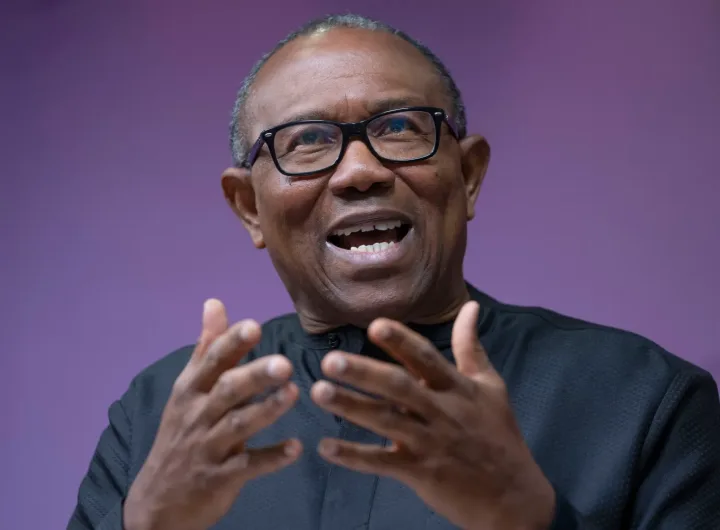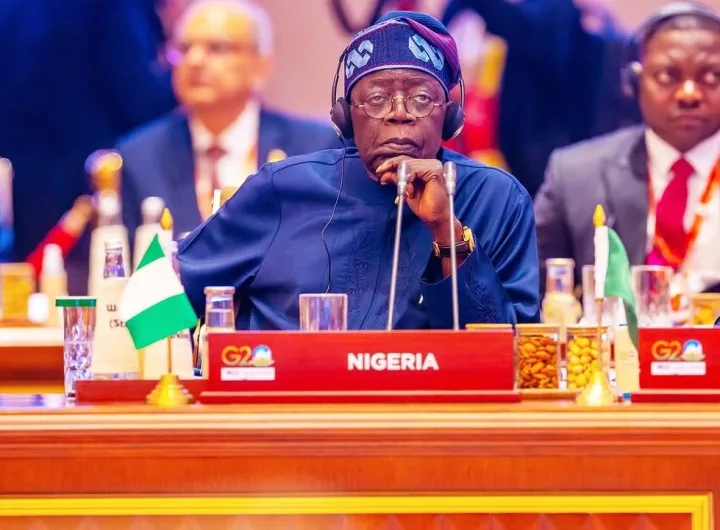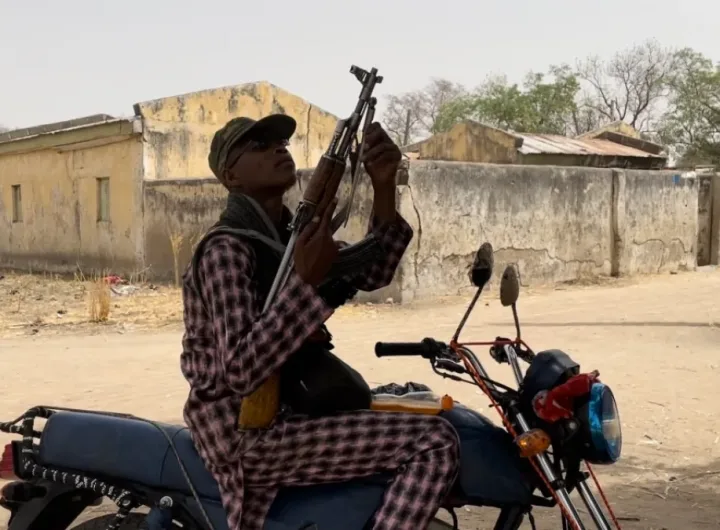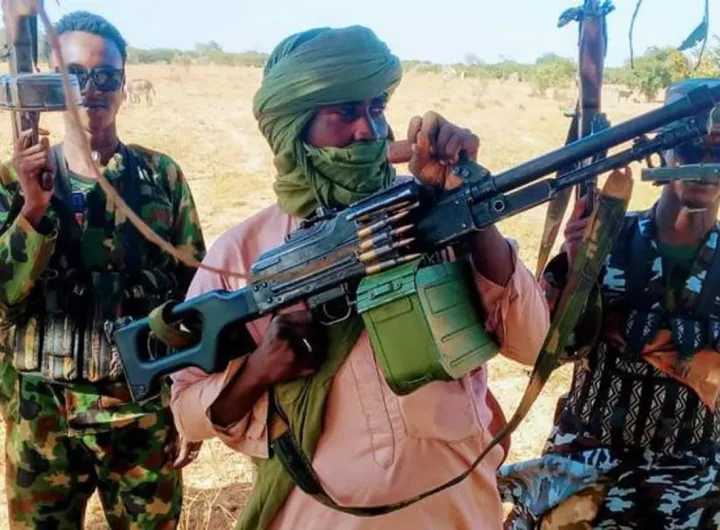
Nnamdi Kanu was sentenced to life imprisonement/Lionscrib
The federal high court in Abuja has concluded a decade-long trial with a life sentence for Nnamdi Kanu, but the verdict raises complex questions about justice, political rights, and regional tensions.
After a tumultuous decade of legal proceedings, separatist leader Nnamdi Kanu has been convicted on seven terrorism-related charges and sentenced to life imprisonment.
The verdict, delivered by Justice James Omotosho of the Federal High Court in Abuja on November 20, marks a dramatic conclusion to one of Nigeria’s most politically charged trials, yet it leaves fundamental questions about guilt, justice, and self-determination unanswered.
The Conviction
Justice Omotosho determined that prosecutors proved Kanu’s broadcasts and orders to the now-banned Indigenous People of Biafra (IPOB) incited deadly attacks on security forces and citizens in the southeast. The judge declared that Kanu’s intention was clear as he believed in violence, and these threats constituted terrorist acts carried out by his followers.
The charges against Kanu included issuing illegal stay-at-home orders across southeastern Nigeria, inciting violence during the 2020 #EndSARS protests, threatening government officials, and membership in a proscribed terrorist organization.
Though prosecutors sought the death penalty, Justice Omotosho cited both international trends away from capital punishment and biblical mercy as reasons for commuting the sentence to life imprisonment.
A Controversial Journey to the Courtroom
Kanu’s path to conviction was anything but straightforward. First arrested in 2015, he fled Nigeria while on bail after his home was raided by military forces in 2017.
His social media posts and Radio Biafra broadcasts during his absence outraged the government, which claimed they encouraged attacks on security forces.
In June 2021, Kanu was controversially detained in Kenya and brought back to Nigeria to face trial. His lawyers argued the extradition was unlawful, undermining any chance of a fair trial. An Abia State High Court even ruled in 2022 that his abduction and forceful return violated local and international laws, though the federal trial continued.
Related: Mbaka Says Nigeria Will Collapse If Nnamdi Kanu Is Hurt
The legal drama intensified when Kanu fired his lawyers and refused to mount a defense, arguing that the terrorism law under which he was charged had been repealed and the charges were therefore invalid. His absence from the final verdict, after being ejected from court for disruptive behavior, added another layer of controversy to proceedings that had already cycled through four different judges.
The Case Against Kanu
The prosecution’s case rested heavily on video and audio recordings of Kanu’s broadcasts. In these recordings, he allegedly made inflammatory statements including threats that Somalia would seem insignificant compared to what would happen to Nigeria if Biafra was not granted independence. The court specifically cited broadcasts where Kanu threatened that those who violated his sit-at-home orders would be burned in their shops.
The sit-at-home orders themselves became a focal point of the trial. These directives, issued across southeastern Nigeria, brought economic activity to a standstill on designated days, with businesses closed and streets deserted. Justice Omotosho ruled that the right to self-determination is a political right, but any self-determination not done according to Nigeria’s constitution is illegal.
The judge also referenced broadcasts in which Kanu allegedly incited violence during the 2020 #EndSARS protests, resulting in deaths of security personnel and destruction of government property in Lagos. Additionally, the prosecution presented evidence of Kanu directing the Eastern Security Network, IPOB’s armed wing, in confrontations with Nigerian security forces.
Questions of Legitimacy
Despite the conviction, significant questions surround the trial’s legitimacy. The Court of Appeal in Abuja had actually struck out the charges in October 2022, citing the illegality of Kanu’s capture in Kenya and his extraordinary rendition to Nigeria. That decision was later overturned, allowing the trial to proceed.
Human rights advocates and legal experts have raised concerns about due process. The circumstances of Kanu’s detention in Kenya remain murky, with Kenyan authorities denying involvement despite his lawyers’ allegations of mistreatment. His lawyers consistently argued that evidence from Radio Biafra broadcasts made in London should not be admissible in Nigerian courts.
Furthermore, Kanu’s refusal to participate in his own defense, while potentially damaging his case, stemmed from his belief that the proceedings were fundamentally flawed. His argument that he was being prosecuted under repealed legislation was never fully addressed to his satisfaction.
Political vs. Criminal
Perhaps the most contentious aspect of the case is whether Kanu’s actions constitute terrorism or legitimate political advocacy. Some observers argue that Kanu’s trial relates more to political issues, including governance quality, leadership crises, and security challenges that have plagued Nigeria.
IPOB seeks independence for the southeastern region, the homeland of the Igbo ethnic group. This area attempted to secede as the Republic of Biafra in 1967, triggering a devastating three-year civil war that killed more than one million people. For many Igbos, the Biafran cause represents legitimate grievances about marginalization, economic inequality, and political exclusion within Nigeria.
Kanu’s broadcasts, while incendiary, touched on real issues facing the region. His rhetoric about Nigerian governance failures resonated with many who feel the Igbo people have been systematically disadvantaged since the civil war. The question becomes: at what point does political agitation cross the line into terrorism?
Regional Tensions and Calls for Political Solution
The verdict has reignited tensions in southeastern Nigeria, with analysts warning it could inflame separatist sentiment rather than quell it. South-East leaders have rejected the conviction and called for a political solution. Deputy Speaker Ben Kalu, speaking for Igbo leaders, expressed optimism that a political approach could secure Kanu’s release, expressing confidence that President Bola Tinubu would listen to their pleas.
Critics have pointed to what they see as double standards in how Nigeria handles separatist movements and insurgencies. While negotiations and amnesty programs have been extended to militants and terrorists in other regions, particularly the North, similar considerations were not granted to Kanu or IPOB. This perceived disparity feeds narratives of ethnic discrimination and unequal justice.
The sit-at-home orders, while presented as evidence of terrorism, also demonstrated Kanu’s genuine influence and the population’s support for, or fear of, IPOB. Whether driven by conviction or coercion, the widespread compliance with these directives revealed deep dissatisfaction in the region.
The Verdict’s Implications
Kanu’s conviction and life sentence resolve the legal question of his guilt within Nigeria’s judicial system, but they do not settle the broader questions his case raises.
Is he a terrorist who incited violence and threatened national security? Or is he a political prisoner whose harsh treatment reflects Nigeria’s intolerance for legitimate self-determination movements?
The answer likely depends on one’s perspective. To the Nigerian government and many citizens outside the southeast, Kanu is a dangerous extremist whose rhetoric led to deaths and destruction. His broadcasts called for violence, his organization was linked to attacks on security forces, and his actions disrupted the lives of millions.
To many in the Igbo community and supporters of Biafran independence, Kanu is a freedom fighter whose prosecution exemplifies the very injustices he spoke against. They argue his words were political speech, protected expression about genuine grievances, and that the violence attributed to IPOB was either exaggerated, provoked by government overreach, or committed by rogue elements beyond Kanu’s control.
International human rights organizations have expressed concern about the fairness of the proceedings, particularly regarding Kanu’s rendition and the circumstances of his detention. Questions about whether he received adequate opportunity to defend himself and whether the trial met international standards for justice remain unresolved.
Moving Forward
As Kanu begins his life sentence, Nigeria faces critical decisions about how to address the underlying issues his movement represents. The southeastern region’s grievances about marginalization and inequality predate Kanu and will persist after him. IPOB, despite its proscription, continues to have significant support in the region.
The calls for a political solution from southeastern leaders suggest recognition that purely legal or security approaches cannot resolve what is fundamentally a political problem. Previous attempts to negotiate with or grant amnesty to armed groups in other parts of Nigeria set precedents that make the hardline approach to Kanu seem inconsistent to many observers.
Whether Kanu is guilty of terrorism in a legal sense has now been determined by Nigerian courts. Whether that verdict represents justice, or whether it will contribute to peace and stability in southeastern Nigeria, remains an open question. The life sentence imposed on Kanu may have closed one chapter in Nigeria’s struggle with separatism and self-determination, but it has likely opened another.
The ultimate judgment on Nnamdi Kanu’s guilt may belong not to judges and courts, but to history and the Nigerian people themselves, who must decide whether the path forward lies in prosecution or in addressing the political grievances that gave rise to his movement in the first place.

![US President Donald Trump shared an image on Truth Social depicting himself alongside CIA Director John Ratcliffe observing a US military operation in Venezuela from Palm Beach, Florida, on January 3, 2026 [@realDonaldTrump/Handout via Reuters]](https://www.lionscrib.com/wp-content/uploads/2026/01/WhatsApp-Image-2026-01-06-at-7.08.55-PM-720x530.webp) Why Trump Invaded Venezuela
Why Trump Invaded Venezuela  Burkina Faso Celebrates Security Progress And Food Independence In 2025
Burkina Faso Celebrates Security Progress And Food Independence In 2025  Why Peter Obi Defected To The ADC
Why Peter Obi Defected To The ADC  President Tinubu Insists New Tax Legislation Will Begin January 1, 2026
President Tinubu Insists New Tax Legislation Will Begin January 1, 2026  Catholic Priests Injured in Bandit Attack in Nasarawa
Catholic Priests Injured in Bandit Attack in Nasarawa  Bandits Kidnap Living Faith Church Pastor And Four Others In Kogi State
Bandits Kidnap Living Faith Church Pastor And Four Others In Kogi State